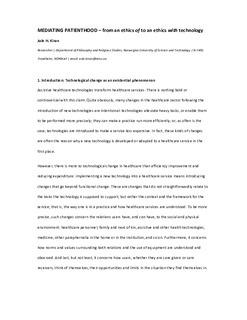Mediating patienthood - from an ethics of to an ethics with technology
Journal article, Peer reviewed
Accepted version
Permanent lenke
http://hdl.handle.net/11250/2483361Utgivelsesdato
2016Metadata
Vis full innførselSamlinger
Sammendrag
The changes that happen to healthcare services after the implementation of new assistive healthcare technologies (also called ‘welfare technology’ in the Nordic countries) concern more than increased efficiency and reducing healthcare expenditure. Of particular interest from an ethical point of view are the manners in which technologies shape the roles and identities of care receivers and healthcare personnel. The notion of ‘patienthood’ is explored in this paper as something that is both challenged by new technologies, and as something that is opened up for active and potentially positive reshaping when care receivers support their illness or frailty with assistive healthcare technologies. This dual effect of technologies (as both challenge and opportunity) requires a rethinking of ethics of technologies, which for most part have been preoccupied with ethical issues prior to the implementation of a new technology into a healthcare service. Ethics of technology should also contribute to the concrete efforts of care receivers to establish something approximating a ‘good patienthood’ in relation to a new technology, making it opportune to dub it, instead, an ethics with technology. This paper explores how assistive healthcare technologies impact on care receivers and the care situation, and in relation to the notion of patienthood, before turning to what this implies for an ethics that has as its goal to support care receivers to reach a life with the technology that is in line with their own notions of well-being and a good life.
